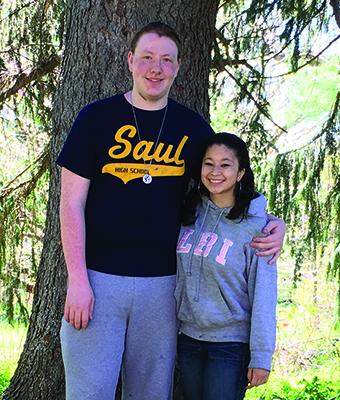
Student Spotlight: Jade Santiago

Want to Know More?
Jade Santiago, pictured with her project partner Justin Sipe, is working to help Saul get rid of palm oil products. For more information or to get involved, contact WWCP’s Youth Education Coordinator Tara Campbell at tcampbell@weaversway.coop. Or just visit the websites of the Union of Concerned Scientists (www.ucsusa.org), which publishes a Palm Oil Scorecard, and the Roundtable on Sustainable Palm Oil (www.rspo.org).
Jade Santiago is a senior at Saul High School who is working hard to inform people about the negative impacts of the palm oil industry on the planet. We are proud to support Jade’s efforts!
Palm oil is a big part of people’s daily lives. It’s an ingredient in detergents, cosmetics such as lipstick, soap and even packaged breads and cereals. At Saul High School, palm oil is in our cleaning products — things like soaps, hand sanitizers and janitorial supplies — as well as in the snacks we sell in the vending machine and school store, including chips, candy and snack bars. According to research done by the Philadelphia Zoo, there are over 20 different names for palm oil, including cetyl almitate and sodium kernelate.
As you can see, palm oil is everywhere. This is a big problem because it comes at a huge — and negative — cost to the planet.
Palm oil is grown in Africa, Asia and North and South America. The majority of palm-oil plantations are in Malaysia and Indonesia. These countries are home to some of the most biodiverse tropical rainforests in the world. These forests are being destroyed to make room for palm-oil plantations, at a rate estimated as the equivalent of 300 football fields per hour! Burning forests is a common clearing method, and the fires release harmful carbon emissions into the atmosphere, which contribute to air pollution and climate change. These forests are also home to many rare species, including Sumatran and Bornean orangutans, tigers and pygmy elephants. These animals are losing their homes and being driven toward extinction.
I first learned about the harmful effects of palm oil through my job at the Zoo. I work in the public education program, so I had to learn a lot in order to work with visitors. Before joining the Zoo, I never realized the negative effects of palm oil and how widespread it is. It was horrific to learn that species like orangutans could be extinct within the next 5 to 10 years, and Sumatran tigers in less than three years, because of our palm oil use. I believe the world has a natural balance, and that without these animals, this balance will be affected, which in turn affects us all.
In response to this crisis, at Saul, my partner, Justin Sipe, and I have launched a project called “The Palm Oil Trade.” Our goal is to raise awareness about the negative impacts of using palm oil and also to raise money to change Saul’s cleaning and food products to sustainable alternatives that don’t have palm oil in them. Our hope is that if Saul can make this shift, other schools will see it’s possible and be inspired to do the same.
As students majoring in Environmental Science at an agricultural school, we believe it’s important for people to understand the impact the products they use have on the environment, both now and for future generations. Palm oil is doing so much damage, but we’re committed to spreading the word in the hope of helping to build a global movement for sustainability.
